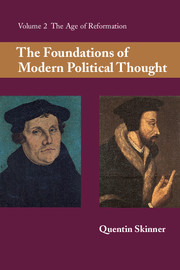Book contents
- Frontmatter
- Contents
- PART ONE ABSOLUTISM AND THE LUTHERAN REFORMATION
- PART TWO CONSTITUTIONALISM AND THE COUNTER REFORMATION
- PART THREE CALVINISM AND THE THEORY OF REVOLUTION
- 7 The duty to resist
- 8 The context of the Huguenot revolution
- 9 The right to resist
- Conclusion
- Further Reading
- Bibliography of primary sources
- Bibliography of secondary sources
- Index
9 - The right to resist
Published online by Cambridge University Press: 05 June 2012
- Frontmatter
- Contents
- PART ONE ABSOLUTISM AND THE LUTHERAN REFORMATION
- PART TWO CONSTITUTIONALISM AND THE COUNTER REFORMATION
- PART THREE CALVINISM AND THE THEORY OF REVOLUTION
- 7 The duty to resist
- 8 The context of the Huguenot revolution
- 9 The right to resist
- Conclusion
- Further Reading
- Bibliography of primary sources
- Bibliography of secondary sources
- Index
Summary
THE REJECTION OF POPULAR REVOLUTION
At the outbreak of the religious wars in 1562, the Prince de Condé, as leader of the Huguenots, issued a Declaration justifying his decision to resort to arms (Caprariis, 1959, p. 100, n.). He argued that by entering Paris at the head of an army, the Guises had ‘placed the will of the Queen in captivity’, and had thus usurped the lawful government, ‘their sole aim being to dispose of the kingdom at their own pleasure’ (pp. 229, 231). His own aim in mobilising, he maintained, was simply ‘to seek for all legitimate means’ to ‘put the persons of the King and Queen at full liberty’, and in this way to ‘uphold the observation of the edicts and ordinances of the king's majesty’ (p. 232). The Declaration culminates in the claim that since the Guises are attempting ‘to intimidate the King's council with menaces and force’, it is the duty of all ‘good and loyal subjects’ to take up arms, since in doing so they will be ‘sustaining the authority of the King and Queen’ against the attempts of ‘seditious rebels’ to ‘ruin the entire commonwealth’ (pp. 229, 232, 233–5).
Given the constraints under which the Huguenots were acting, Condé's strictly limited and carefully constitutional justification of resistance can readily be understood.
- Type
- Chapter
- Information
- The Foundations of Modern Political Thought , pp. 302 - 348Publisher: Cambridge University PressPrint publication year: 1978
- 2
- Cited by

